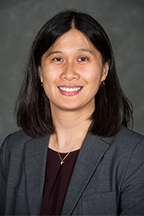非常抱歉,
你要访问的页面不存在,
非常抱歉,
你要访问的页面不存在,
非常抱歉,
你要访问的页面不存在,
验证码:

职称:Assistant Professor, Art History, Asian Art
所属学校:Georgetown University
所属院系:Department of Art and Art History
所属专业:Art/Art Studies, General
联系方式:+1 202-687-3910
Michelle C. Wang teaches courses in Asian art history. Her research specialization is Buddhist art in China, particularly during the Tang Dynasty (618-907 CE). Her book manuscript titled "Mandalas in the Making: The Visual Culture of Esoteric Buddhism at Dunhuang" examines Buddhist mandalas of the 8th-10th centuries at the Mogao Buddhist cave shrines in northwestern China. She is a co-organizer of the 2014-2015 Mellon Foundation-funded Sawyer Seminar "Critical Silk Road Studies" (silkroadseminar.georgetown.edu). Prior to joining the Georgetown faculty, Professor Wang taught for two years at Louisiana State University. In 2006, she co-curated an exhibit of Han Dynasty (206 BCE–220 CE) small-scale animal sculptures titled “A Bronze Menagerie: Mat Weights of Early China” for the Isabella Stewart Gardner Museum in Boston. Her research has been supported by fellowships from the Chiang Ching-kuo Foundation, the Asian Cultural Council, and the Pittsburgh Foundation.
Michelle C. Wang teaches courses in Asian art history. Her research specialization is Buddhist art in China, particularly during the Tang Dynasty (618-907 CE). Her book manuscript titled "Mandalas in the Making: The Visual Culture of Esoteric Buddhism at Dunhuang" examines Buddhist mandalas of the 8th-10th centuries at the Mogao Buddhist cave shrines in northwestern China. She is a co-organizer of the 2014-2015 Mellon Foundation-funded Sawyer Seminar "Critical Silk Road Studies" (silkroadseminar.georgetown.edu). Prior to joining the Georgetown faculty, Professor Wang taught for two years at Louisiana State University. In 2006, she co-curated an exhibit of Han Dynasty (206 BCE–220 CE) small-scale animal sculptures titled “A Bronze Menagerie: Mat Weights of Early China” for the Isabella Stewart Gardner Museum in Boston. Her research has been supported by fellowships from the Chiang Ching-kuo Foundation, the Asian Cultural Council, and the Pittsburgh Foundation.